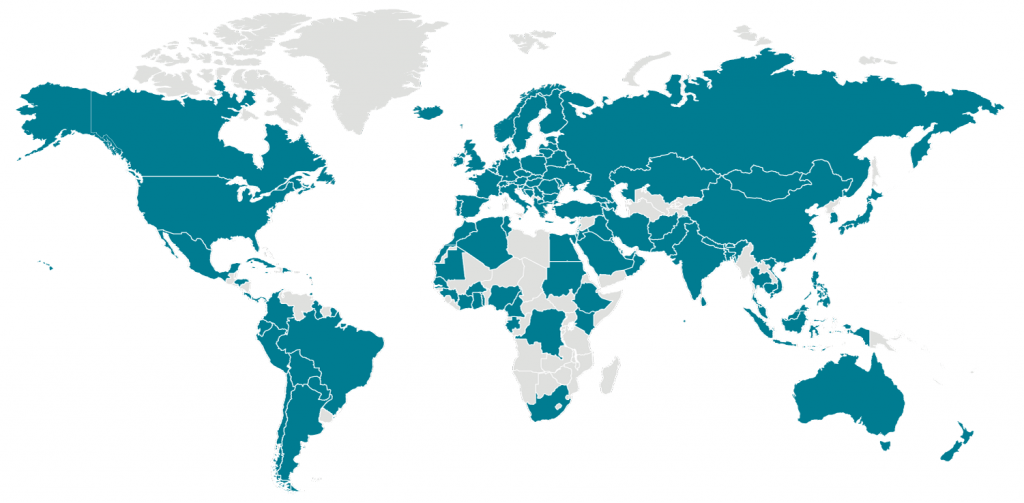
Maine Courts have canceled most criminal and civil proceedings through at least May 1, 2020 over concerns for the COVID-19 pandemic. The court normally operates by calling in a large list of people to gather in confined spaces for hours as cases are slowly processed. The Coronavirus pandemic makes this a potentially dangerous way to conduct business. Through recent orders, the Maine State and Federal Courts have taken steps to limit the risk posed by normal court proceedings. This will have a major impact on how all criminal cases are processed in Maine. Read on or follow these links to view a particular portion of the article.
- Maine Court order postponing most proceedings
- Impact on pending criminal cases
- BMV license suspension hearings
- How our office is responding
- Other government action regarding COVID-19
- Maine Federal Court COVID-19 delays
Maine Court’s COVID-19 order
By a March 13, 2020 order, the Maine Judicial branch made the following announcement:
Effective immediately, and continuing through May 1, 2020, with the exception of the events listed below, all in-person court events for family, civil, and criminal dockets are postponed. The courts will schedule and hear only the following:
- Arraignments and first appearances of defendants held in custody
- Motions for review of bail
- Juvenile detention hearings
- Protection from Abuse requests and hearings
- Protection from Harassment requests and hearings
- Child Protection petitions and hearings
- Mental health requests and hearings
- Hearings granted on motion
This means that no criminal or civil jury trials will be heard in the Maine State Courts until after May 1, 2020, unless otherwise ordered by the court. No grand jury proceedings will be held. All previously-scheduled cases are postponed. Any trials in progress may be completed.
COVID-19 Impact on Criminal Cases in Maine Courts
This order fundamentally changes the way that cases can be processed. None of the following proceedings are being held between now and May 1, 2020. If your case was scheduled for any of these hearings, it has almost certainly been canceled and will be rescheduled:
- Dispositional conferences in all misdemeanor and felony cases
- Arraignments and initial appearances for people not in custody
- Bail hearings for people not in custody
- Hearings on other motions, such as motions to suppress evidence
- Plea hearings and sentencing hearings
- Violations Bureau traffic ticket hearings
Arraignment dates prior to May 1, 2020
If you have been summonsed to court or released on bail with an arraignment date prior to May 1, 2020, these dates will be rescheduled. We are seeing police in some areas resummonsing people for later arraignment dates. In other situations, we are expecting the clerk of courts to directly contact defendants and attorneys about rescheduling these dates.
For our clients with misdemeanor cases (class D or E crimes) that have not yet been arraigned, we have already filed a written not guilty plea for you. That will eliminate your need to appear for arraignment even if you are resumonsed to a new date. In felony cases (class A, B or C crimes) you must plan to appear at the new arraignment date. Please email us a photo or scan of any new paperwork provided to you by the clerk or police.
Defendants in jail pretrial or sentenced
For defendants who are detained pretrial or who are serving reasonably short sentences, there are some options. For those who are detained and can’t bail out for minor offenses, prosecutors and courts are encouraged to reconsider bail and reduce bail where appropriate so that people can get out of jail.
For those nearing release on a county jail sentence, the DAs and Judges may be willing to reduce sentences or to come up with other solutions that could get people out of jail. This is especially true for people who are vulnerable to infection or otherwise at high risk for COVID-19.
The Courts have established a procedure for criminal defense attorneys to file emergency motions for people in custody. These motions could request changes to bail, ask for a plea hearing so people can be sentenced to time served, request a reduction in sentence, or ask for other appropriate relief. You can read this article for more information about Maine’s bail system.
BMV License suspensions
The Maine Bureau of Motor Vehicles has announced the cancelation of all license suspension hearings and the closure of all branch offices. The BMV has not set a firm date for resuming hearings or reopening offices. All drivers impacted by these delays will be granted a “stay” on their suspensions. This means that the suspensions will be put on hold and the driver will be allowed to drive until the hearing is held.
Many people were already on a stay and that will continue. Others, especially those who were suspended for refusing a chemical test and awaiting a hearing, will have their suspensions lifted so that they can resume driving. While a suspension is stayed, the driver is not accruing time toward the license suspension term that may ultimately be imposed. Some drivers may decide that they do not want the suspension stayed. If that is the case, the BMV can be notified and will remove the stay so that suspension time can continue to accrue. If you are a current client with a pending BMV hearing and want the stay removed, contact us immediately. Follow this link for more about Maine OUI license suspensions generally.
How our offices are responding
We are taking steps to determine which of our clients may be detained in jail and eligible for release on bail or by other means. We are filing emergency motions in appropriate cases.
Though Courts are not holding normal proceedings, the District Attorney’s office remains open and we will continue to discuss and negotiate cases with the prosecutors. Even though court dates are being scheduled only in exceptional cases, it is possible to reach agreements on matters and either resolve those cases or set them up for resolution once courts resume a normal schedule. Additionally, we are:
- Limiting visits to our office and conducting business by phone or other means where possible.
- Limiting staff time in the office and having staff work from home where possible.
- Continuing to monitor phone and email full time.
- Continuing to do the other work needed to defend our clients including reviewing discovery, researching legal issues, drafting pleadings. Much of the work we do does not happen in court and that work will continue regardless of the court’s schedule.
Other government action regarding COVID-19 in Maine
Maine courts, sheriffs and others have taken further steps to address the Coronavirus concerns and to deal with the limitation of court schedules:
- March 16, 2020 court order canceling all warrants for failing to pay fines, restitution, court fees, or for failing to appear for hearings on those matters. (link removed)
- March 16, 2020 court order expanding the use of video and telephone for certain contacts with parties to some litigation. (link removed)
- March 17, 2020 court order suspending medical malpractice proceedings and tolling all deadlines for such cases. (link removed)
- March 13, 2020 Cumberland County Sheriff’s announcement suspending all prisoner visits at the Cumberland County Jail in Portland.
- Maine Federal Court Orders suspending all criminal and civil trial proceedings until at least May 1, 2020.
- My post about the Federal Court’s response and postponement of Criminal proceedings
Update: April 14, 2020 order
The Maine Judicial Branch has removed earlier COVID-19 orders from their website since those orders have been superseded and replaced by March 30 and April 14 orders. The Maine State Court COVID-19 orders are all hosted here. The latest April 14, 2020 order is effective immediately and clarifies what the court is and is not dealing with during this time.
Effective immediately, and continuing through May 1, 2020, unless otherwise ordered by the court, the following case types and proceedings will NOT be scheduled or heard:
- FED (eviction, landlord/tenant)
- Disclosures
- Foreclosures
- Small Claims
- Medical Malpractice proceedings including Panel Hearings
- Family matters
- Contested adoptions
- Juvenile matters (unless the juvenile is being detained)
- Criminal matters (except as related to the incarceration of a defendant)
- All other nonjury civil matters including civil violations
- All actions to recover personal property
- All Violations Bureau hearings (traffic tickets)
All previously scheduled cases are postponed. An extension of these limitations beyond May 1, 2020 is likely but has not yet been ordered. The courts WILL schedule and hear only the following:
- Arraignments and first appearances of defendants held in custody
- Motions for review of bail of defendants held in custody
- Juvenile detention hearings
- Protection from Abuse requests and hearings
- Protection from Harassment requests and hearings
- Child Protection petitions and proceedings…limited to Summary Preliminary Hearings, Jeopardy Hearings, Judicial Reviews, and Case Management Conferences.
- Mental health requests and hearings
- Emergency guardianships
- Uncontested adoptions
- Petitions for Review concerning Control of Notifiable Diseases (22 M.R.S. §820)
That last category is interesting. It references 22 M.R.S. §820, a statute that allows DHHS to take people into custody under certain circumstances if:
The department has reasonable cause to believe that the person has been exposed to or is at significant medical risk of transmitting a communicable disease that poses a serious and imminent risk to public health and safety
The April 14 order does allow for other hearings to be scheduled if the party requesting the hearing can convince the court of the following:
- The nature of the matter for which a hearing or other court action has been requested is urgent and compelling;
- The hearing can be held without requiring the presence of additional court staff;
- The proceeding can be undertaken without requiring the in-person participation of any parties, witnesses, or attorneys; and
- The proceeding can be undertaken without requiring the physical proximity of any participants or placing undue stress on those necessary to the proceeding.
On April 14, Governor Mills extended Maine’s state of civil emergency until May 15, 2020 so it seems almost certain that the Maine Courts will need to extend their orders until at least that date.
Update: April 22, 2020 order extends closure to May 15, 2020
The Maine Supreme Judicial Court and Judicial Branch have issued a new “pandemic management order”. It appears that they are treating this order as a revision and replacement of all prior orders discussed above. Unsurprisingly, the order extends the partial closures and limitations on criminal court proceedings through at least May 15, 2020.
In part, ther order provides as follows:
Persons identified as being infected by COVID-19, having had contact with those infected by COVID-19, or having visited areas identified as problematic due to the prevalence of COVID-19 should not come to Maine’s courthouses. If that happens, call the courthouse where you were required to attend.
PMO-SJC-1
Even people who have not visited hot spots create an interesting issue if they live or have traveled out of the State. Maine’s Governor has ordered that people arriving in Maine from out of state, self quarantine for 14 days. This will make it very difficult or impossible for people who live outside of Maine to personally appear for any court proceedings unless then arrive to Maine two weeks before their hearing. We will see how that plays out.
Note that most courts have some kind of limited hours right now with many clerks offices open only for half days. Further information about a specific Maine State Court’s hours and closures is available here.





